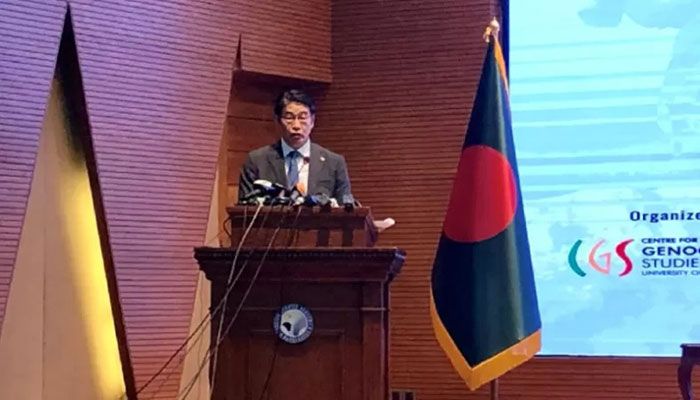
Desk Report
Publish: 26 Aug 2022, 08:04 pm

Japanese Ambassador to Bangladesh Ito Naoki speaks at a seminar in Dhaka on Thursday || UNB Photo: Collected
Japanese Ambassador to Bangladesh Ito Naoki has said it is "vital to consider third-country resettlement" in parallel to the repatriation of the Rohingyas to their place of origin in Myanmar, reports UNB.
“Accepting refugees through third-country resettlement is one of the permanent solutions. It is a way to share the burden of the refugee crisis among the international community,” said the ambassador.
In December 2008, Japan decided upon a pilot programme to accept refugees from Myanmar through third-country resettlement as the first country in Asia.
Until today, 54 families and 200 people, including Rohingya, were resettled through this scheme, said the ambassador.
He hoped that they could consider further possibilities of Rohingyas’ resettlement in Japan with the guidance of UNHCR.
Earlier, US Secretary of State Antony J Blinken said as an essential component of an international, comprehensive humanitarian response, they are working to "significantly increase resettlement" of Rohingya refugees from the region, including from Bangladesh, so that they can rebuild their lives in the United States.
Naoki said Japan, together with Bangladesh and the international community, will do its utmost to create conditions for safe, voluntary, dignified, and sustainable repatriation to Myanmar.
Japanese envoy said his country will continue to actively provide humanitarian support, paying close attention to the needs of the Rohingya people facing challenging circumstances.
He made the remarks while speaking at a seminar titled “Rohingya Crisis: The Pathways to Repatriation” hosted by the Centre for Genocide Studies (CGS), the University of Dhaka on Thursday.
Foreign Minister Dr AK Abdul Momen spoke as the chief guest at the seminar. Special Envoy of the United Nations Secretary-General on Myanmar Noeleen Heyzer, Foreign Secretary Masud Bin Momen, US Embassy Dhaka’s Regional Refugee Coordinator Mackenzie Rowe and Dr Imtiaz Ahmed also spoke.
Ambassador Naoki said the fundamental solution to the Rohingya crisis is to realise the repatriation of the Rohingya refugees to their homeland Myanmar.
“Japan will stand ready to cooperate with Bangladesh to this end. We commend the efforts of the government to start the repatriation early through the bilateral dialogue. I see the urgent need for early repatriation,” he mentioned.
Given the current political situation in Myanmar, it is a challenging task, he added.
Despite the difficulty, Naoki said, the international community must make the utmost efforts to support the government of Bangladesh and create an enabling environment for the early start of the repatriation process.
The ambassador said it is highly commendable that the government and the people of Bangladesh have shown a humanitarian stance and generously provided shelter to Rohingya refugees over the past five years.
Japan will continuously support and show its solidarity with Bangladesh and Rohingya, he said.
In January 2022, Japan provided $2 million in seed funding to UNHCR and WFP as the first donor to help operations on Bhasan Char.
“Nevertheless, I believe that the situation in Bhasan Char could be more creative and sustainable,” said Naoki who has been to Bhasan Char twice.
Since the coup in Myanmar on February 1st last year, he said, Japan has taken every opportunity to strongly urge the Myanmar military to immediately stop the violence; release those detained, and swiftly restore the democratic political system.
The ambassador said Japan has also been working closely with the international community, including ASEAN countries, to improve the situation in Myanmar.
“I believe that improving the situation in Myanmar, including restoring its democratic regime, is essential to achieving sustainable repatriation of Rohingya refugees,” he said.
“Also, we must improve the condition in the Rakhine state, and Japan has been providing financial support for that,” he added.
Five years ago, Myanmar’s military launched a brutal campaign against Rohingya – razing villages, raping, torturing, and perpetrating large-scale violence that killed thousands of Rohingya men, women, and children.
More than 7,40,000 Rohingya were forced to flee their homes and seek refuge in Bangladesh.
Subscribe Shampratik Deshkal Youtube Channel
© 2024 Shampratik Deshkal All Rights Reserved. Design & Developed By Root Soft Bangladesh